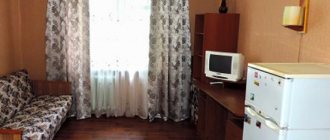Typologies of dormitories
Dormitories, depending on the form of ownership, are divided into two types. The first ones belong to an enterprise or educational institution. To move in, you must have an agreement on employment or admission to an educational institution. Otherwise, it is impossible to move into it. The second type includes commercial dormitories. They belong to a private person. A room in a dormitory of this type can be rented by absolutely anyone for a fee. Types of dormitories, depending on the status of residents, are divided into family, work and student. According to their layout, dormitories are divided into block, apartment, corridor and hotel.
Rights of students living in the dormitory:
- ? Live in an assigned living room for the entire period of study at the educational institution, subject to compliance with internal regulations;
- ? use educational and cultural premises, equipment, and inventory of the hostel;
- ? make proposals to the administration of the educational institution to amend the rental agreement for residential premises in a student dormitory;
- ? move with the consent of the administration to another residential premises of the hostel;
- ? elect the student dormitory council and be elected to its composition;
- ? participate through the student council of the hostel, the trade union organization of students in resolving issues of improving the conditions of students, organizing extracurricular educational work and leisure, equipping and decorating living quarters and rooms for independent work, distributing funds allocated to improve social and living conditions.
For family
A family hostel requires obtaining a warrant from an enterprise or trade union organization. This order allows the family to have their own room. Previously, for this it was necessary to distinguish yourself by special merits or achievements, as well as to go through the queue. In a family hostel, residents must have an officially assigned room. As for living conditions, they are the same as in any other hostel or communal apartment. Usually this is a shared kitchen, a shared bathroom and other amenities, which may not be available at all. It is important to understand that a room in a family-type hostel cannot be subject to privatization. In this regard, there are cases of frequent resale of such residential properties.
Family hostel: responsibilities of residents
The rules for living in a family-type hostel include several mandatory points:
- comply with internal regulations and fire safety requirements;
- use the housing provided for use exclusively in accordance with its purpose;
- take care of the living quarters and common areas, as well as the provided inventory and equipment;
- maintain cleanliness and order in premises intended for family living and public use;
- do not waste water, gas, electricity and heat;
- do not delay utility bills and payments for the use of the premises.
In addition, the administration of any hostel assumes the right to introduce additional internal rules. As for persons who violated the rules of living in a hostel, they face punishment in accordance with legislative acts.
Conditions for terminating the rental contract for residential premises in a dormitory
Art. 115 of the Russian Housing Code also determines the procedure according to which a rental agreement for residential premises in a hostel is terminated. The reasons for this are the end of the labor relationship, leaving the service, or the end of the term in an elective position. Persons who were moved into the dormitory on the basis of a fixed-term employment contract, employees who were engaged in seasonal activities, as well as students who graduated from their studies must vacate the occupied housing.
If they refuse to be evicted in the prescribed manner of their own free will, they will be evicted through the courts.
This category of persons is evicted from the hostel without the provision of other housing in connection with the end of work or study, since they no longer belong to the subjects of the right to use residential premises in the hostel. The only exceptions are persons who are listed in Article 103, Part 2 of the Housing Code. What could be the grounds for ending the employment relationship in such a case? Dismissal can occur at the request of the employee, that is, the process occurs according to his personal will, or the initiator of the process can be the employer.
Thus, we can conclude that such a contract is concluded exclusively for the duration of the employment relationship, study or service. Termination of such relations is the reason that leads to the termination of the document. Citizens are evicted from dormitories in the same way as from official housing.
Author of the article
Dorm life of a worker
This type of dormitory is a room, most often a separate building. It is divided into many private rooms or shared bedrooms. The duration of residence in it, as a rule, is limited to the duration of the employee’s work in a particular organization. As for comfort, it can be of completely different levels, as it depends solely on the owner. Some have to live in rooms located in a dilapidated building, with poor sanitation and worn-out furniture.
But there are hostels that are absolutely comfortable for living, otherwise called economy hotels. The question arises as to why can’t every worker’s hostel be comfortable and up to standard? First of all, this is due to the lack of definition of the word “hostel” in the legislation of the Russian Federation. Thus, they cannot be equated to hotels and cannot be required to meet the same standards.
Rooms in workers' dormitories are usually occupied by four, six or eight people. But there are also cases when twenty workers are crammed into one room. The room is equipped with several bunk beds, a wall hanger, a wardrobe, a dining table and four or six chairs; each person is provided with a mattress, pillow, blanket, and bed linen. The dormitory for workers has a block bathroom, which is located outside the rooms on the floor, in a specially equipped sanitary area.
Resident students may be evicted from the dormitory if:
- ? use of residential premises for other purposes;
- ? destruction or damage to residential premises by residents or other citizens for whose actions he is responsible;
- ? refusal of residents to register at their place of stay;
- ? systematic violation by residents of the rights and legitimate interests of neighbors, which makes it impossible to live together in the same residential premises;
- ? non-payment of rent by residents for residential premises within three months;
- ? absence of residents from the hostel without written warning for more than two months;
- ? appearing in a hostel under the influence of alcohol or drugs;
- ? storage, distribution of narcotic drugs;
- ? storage of explosives, chemically hazardous substances or firearms by residents of the dormitory;
- ? expulsions from an educational institution;
- ? other cases provided for by the legislation of the Russian Federation.
And lastly, the omnipotence of the janitor in the hostel is a myth. All disciplinary penalties (reprimand, reprimand or expulsion from an educational institution with termination of the rental agreement for residential premises in a dormitory) are formalized only by order of the rector of the educational institution .
How should a worker living in a dormitory behave?
As you know, workers are a category of people who more often than others find themselves in unkind situations. Making noise and drinking too much is always welcome. In this regard, the requirements from the hostel administration are more stringent for them. To maintain security, the hostel administration assumes the right to inspect personal belongings in order to identify prohibited items. You cannot carry: alcohol and beer, bladed weapons and firearms, poisonous and explosive substances, narcotic and psychotropic drugs. Also, the rules of residence in the hostel oblige residents to freely admit administrative staff during scheduled and unscheduled inspections.
In the event of an accident or other emergency in the block, residents are required to immediately notify the administration. In the workers' dormitory, it is necessary to maintain cleanliness both in the personal room and on the premises. Residents are required to follow safety rules. You must not damage furniture or other property owned by the hostel. Also, the rules for living in a dormitory include the need to hand over the keys to the janitor when leaving the building, throw garbage into specially equipped baskets, cook food only in the kitchen, and maintain silence.
Responsibilities of students in the dormitory
Of course, dorm residents have not only rights, but also responsibilities. There are not very many of them and they are not burdensome:
- Follow the rules of residence, which are set out in the relevant Regulations, and internal regulations.
- Treat the room, furniture, equipment and equipment with care. Repair broken items at your own expense.
- Avoid excess consumption of gas, electricity, and water.
- Maintain order in common areas (with staff cleaning them).
- Keep your room clean (clean regularly, take out the trash).
- Adhere to the norms of good neighborliness: do not exceed the permissible noise level, observe the order of duty, etc.
- Pay for hostel accommodation on time.
- To the extent possible, participate in the improvement of the hostel and the surrounding area.
By the way! For our readers there is now a 10% discount on any type of work
Marked "Prohibited"
Residents of workers' dormitories are prohibited from allowing strangers into their rooms, especially if they are minors. Also, under no circumstances should you use electrical appliances within the walls of the room, come to the dormitory in a drunken state, move to another room at will without the approval of the administrative staff, smoke in the room, bathroom, dining room or hallway, and throw garbage into the toilet. You need to know that the administration does not bear any responsibility for personal belongings left by a resident in a dorm room.
Responsibilities of students living in the dormitory:
- ? strictly observe the rules of residence and the internal regulations of the student dormitory, safety precautions, fire and public safety;
- ? treat the premises, equipment and inventory of the student dormitory with care, use electricity, gas and water sparingly, maintain cleanliness in residential premises and common areas, clean your living rooms (blocks) daily;
- ? timely, in the manner established by the educational institution, pay for accommodation, utilities and for all types of additional services consumed, provided at the request of residents;
- ? compensate for material damage caused in accordance with the legislation of the Russian Federation and the concluded rental agreement for residential premises;
- ? comply with the provisions of the residential rental agreement concluded with the administration of the educational institution.
Dedicated to students
Students are young, active and always looking for adventure. The most popular place for student mischief is the dormitory. The student dormitory is very similar in format and living conditions to the dormitory for workers. Only students from one educational institution are accommodated in it, in accordance with the order. Strangers cannot claim to live in it. As for responsibilities, students living in a dormitory have more than enough of them.
The student is obliged to fulfill all the requirements specified in the rental agreement for residential premises, and without fail, within the prescribed period, submit the documents necessary for registration at the place of residence and military registration.
Visitors can come to the student only at strictly established times, and each resident of the student dormitory is required to move in accordance with the access regime.
The remaining responsibilities of a resident of a student dormitory are identical to the responsibilities of a resident of a dormitory for workers.
If a student does not comply with or violates the rules of residence in the hostel, he faces eviction. Also, the reason for eviction is the expiration of the contract, an application from the student, or expulsion from the educational institution.
Purpose of residential premises in the dormitory
The Russian Housing Law identifies eight types of premises related to specialized housing. One of these types is dormitories. A dormitory is a building, a house, built for temporary residence, or adapted for use by citizens during the period of their official and professional duties, as well as undergoing vocational training.
With the expiration of the specified period, the rental agreement for residential premises in the hostel ceases to be valid; as a general rule, the person’s right to use the housing disappears. The procedure for terminating legal relations between the parties regarding placement in a dormitory is regulated by Art. 105 of the Housing Code of the Russian Federation, it states that the grounds for termination of the contract are completion of studies, termination of performance of professional and official duties.
Only those persons who have an employment or official relationship with the enterprise or institution that provides housing, or are studying in these organizations, can legally live in a dormitory. Based on the analysis of current legislation, residential premises in dormitories are intended exclusively for the residence of these categories of persons; other citizens are not accommodated in dormitories.







